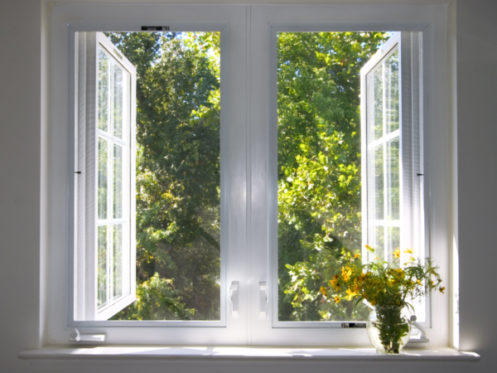When it comes to saving money, lowering your carbon footprint, and making sure that everyone is comfortable, finding and installing an efficient and high-performing heating system is essential. However, even the very best furnaces, heat pumps, and boilers are guaranteed to under-perform in buildings that lack sufficient efficiency of their own. One of the biggest causes of energy loss in nearly every Stuart, Florida home are windows. Keep reading to find out how your windows impact your home’s heating.
Old, Leaky Windows Can Cost You a Fortune Over Time
As windows age, the integrity of their seals starts to decline. If your windows have failing seals, you may be able to feel a slight breeze when standing next to them even when they’re fully closed. During winter, window leaks allow cold outdoor air to enter the building. They also allow the warm air that your heating unit has produced to seep out.
You may have failing window seals if your heating unit runs constantly but the interior of your home never reaches your preferred temperature. If you have older, single-pane or double-pane windows, upgrading these features is a great way to both save cash and add value to your property. Triple-pane and quadruple-pane options will provide better insulation, inhibit air loss, and limit the amount of work that your heating system has to do.
Condensation Can Make Your Home Feel Muggy and Uncomfortable
Having window leaks can affect your indoor comfort in other ways. Not only do leaky windows cause heat loss and allow cold air to enter the living environment, they’re also responsible for problems like condensation and mold. In fact, one of the first and most obvious signs of a window leak is condensation on the inside of the windowpane. Condensation may even pool in the window seal or run down the surrounding drywall. Constant problems with excess moisture create the perfect conditions for mold, mildew, and many other harmful pathogens. They can also leave your indoor air feeling muggy and oppressive.
Your Indoor Air Quality Will Suffer Too
Even as window leaks affect your home heating, it’s important to consider how they’ll eventually impact your indoor air quality and health. As mold and mildew start to form in and around windows, the symptoms of mold exposure will begin to manifest. These can include:
- Coughing
- Sneezing
- Wheezing
- Runny nose
- Itchy, watery eyes
- Fatigue
- Headaches
If the mold spores that are responsible for these symptoms make their way into your HVAC system, you could find yourself battling mold problems indefinitely. Although central, forced air heating systems tend to produce dry heat, the interior of HVAC air ducts are frequently damp and perfectly habitable for fungi.
Thermal Heat Gains and Thermostat Placement
Even if window leaks aren’t a problem in your home, there may be other issues related to your windows that are having a non-stop impact on your heating system. For instance, if your thermostat is installed too close to a window or if it’s installed in any area that’s subjected to direct sunlight throughout the day, your heating unit may never turn on even when the building interior is downright freezing. Positioning a thermostat too near any heat source can affect its ability to take accurate readings of the indoor temperature. When the sun is beaming down on this component, your thermostat will register your home interior as being far warmer than it actually is. If this is a problem in your home, contact an HVAC company to have your thermostat installed in a more favorable location.
Open Windows Will Cause Your Heating System to Overwork
If you have a central heating system that isn’t zoned, you may have one or more people who regularly open windows throughout the home when they feel overheated. Central heating systems warm the entire building interior uniformly. Thus, when you set your preferred temperature at the system’s central thermostat, your furnace, boiler, or heat pump will continue running until every room reaches this temperature.
It’s important to let your family members know that opening windows while your heating system is on is never a good idea. Not only does this result in wasted energy, but it can also diminish your unit’s lifespan. Your heating system will work harder all throughout each heating cycle, and it will endure longer heating times overall. It will also have to deal with the excess dirt, dust, dander, and other airborne debris that gets pulled in through your open windows.
Before turning your heating unit on, you may want to do a quick visual inspection of all windows to ensure that they’re sealed shut. This includes windows in your bathrooms and attic. If you have an attached garage that isn’t serviced by your central heating system, you should close the door to your garage as well.
How to Fix and Avoid Window-Related Heating Issues
Most windows are rated to last about 15 to 20 years. Coincidentally, the average lifespan of a furnace is about 15 to 20 years as well. If your furnace and windows were installed at the same time, it’s probably a good idea to upgrade or replace both of these features together. If you don’t have the budget to take care of both projects at once, try to replace your windows within one to three years of your furnace replacement. The sooner that you do, the longer your furnace will last and the more efficient it will ultimately be.
If you have multiple people in your home who get hot long before a reasonable indoor temperature has been reached, you may want to consider having your HVAC system zoned for efficiency. With zoning, every room or zone throughout your home will be given its own thermostat. Each thermostat can be set independently of all others. Your HVAC company will also install dampers in your ductwork that will direct heat to or away from each area as needed. Zoning allows residents to establish their own preferred temperatures. It also eliminates the need to heat or cool spaces that aren’t in use.
If your windows haven’t reached the end of their lifespan but appear to have leaky seals or other areas of air loss, consider adding weatherstripping. There are also high-quality window treatments, such as thick drapes and airtight blinds, that can trap indoor heat in and prevent cold outdoor air from entering. The more effort that you put into preventing heat loss, the less money that you’ll spend overall to keep your home warm this winter season.
Finally, it’s always best to schedule preventative heating maintenance before the cold season starts. If you’ve got leaky windows, leaky air ducts, or other problems that will impact the efficiency and performance of your heating system, you’ll want to have these issues diagnosed and resolved ahead of winter’s arrival.
Our Professional Services
At Billfish Air Conditioning, LLC, we offer heating and cooling maintenance, installation, and repair services. We also offer HVAC ductwork and preventative maintenance plans. We’ve been proudly serving residents of Stuart, Florida and the surrounding areas for quite some time. If you need help getting your home heating system ready for winter, give us a call today!


